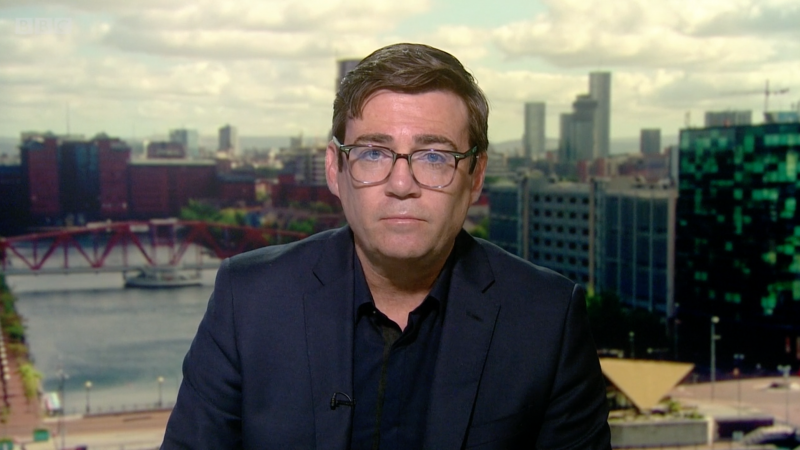
Andy Burnham told a parliamentary committee this morning that if the Greater Manchester mayor were ever to return to national politics as an MP, “it would only be to champion fundamental constitutional reform of England”.
Appearing before the public administration and constitutional affairs committee today, Burnham and North of Tyne combined authority mayor Jamie Driscoll criticised the over-centralisation in English politics and called for greater devolution.
Burnham, a former minister, told MPs that during the ’80s there was a “growing distrust of local government” that continued into the Labour government, with “top-down targets imposed on everybody” in order to ensure policy delivery.
“I don’t think the country is going to rise to the challenges it needs to by carrying on in the way that it has,” he added. “You will not level up this country top-down from Whitehall – it simply won’t happen.”
He told MPs that the 21st century will be “driven by cities, the digital economy and the green economy” and argued that to succeed the country needs to “empower people from the bottom up to bring through the change that’s going to come”.
The Labour mayor of Greater Manchester added: “It’s a very 20th-century notion, I think, to think that we can run everything through top-down, and I think if we try that we’re going to get left behind.”
He also criticised a “culture of bidding” for funding, which he described as “wasteful of everyone’s time of everyone’s energy”, and called for more long-term, devolved funding because it is “better in building quicker delivery”.
Labour raised concerns earlier this year after the government published its prioritisation of the new ‘levelling-up fund’, which saw Rishi Sunak’s constituency and those of other cabinet members’ areas made able to bid ahead of others.
Burnham also told MPs that greater devolution in England could tackle the “silo culture” of departmental and policy-area focus in Whitehall, where he argued nobody takes responsibility “for the whole child, or the whole community”.
“We can break down those silos on the ground. We can join the dots and we can come up with a place-based approach or whole person approach. And that actually could lead to public spending being much more, more effectively used,” he said.
“The over-centralisation is a problem but then so is the policy-specific silo approach of the way we organise government and English devolution is, as I say, a way of making things work much more coherently when policy hits the ground.”
Driscoll defined one of the benefits of the mayoral model as it being “stacked in favour of collaboration” because there is “no shadow mayor trying to score points every week”, which means he works with MPs and local councillors.
“To succeed, you have to build partnerships. It’s not about having a majority or a good whip operation. Success is built on personal relations, not party patronage. So it’s a different kind of leadership – very much about the win-win,” he said.
Asked what a vision for English devolution looks like, Driscoll replied: “Done is better than perfect. If we are trying to develop a neat system that addresses all of the questions that we’ve been asked today, we’re not going to get there.”
He added: “Maybe we wouldn’t have started with the mayoral combined authorities but that’s what we’ve got, and they’re working, and they are popular. So we use that model and extrapolate from it, and in some areas, particularly rural areas of England in might need to be a bit different, but that basic principle is what matters.”
Burnham broke it down into three steps: local, regional and national. He said reform at local level is needed to create a more “empowered, well-funded and trusted local government”, adding: “That’s the building block for all of this.”
He called for regional authorities to receive “long-term control over public spending that already takes place in our region” and said parliament must represent “all of those entities across England equally in a way it just doesn’t”.
Burnham told the committee that both national structures and national parties have a “blind spot when it comes to English devolution”. “Our own party structures have a blind spot when it comes to English devolution,” he added.
The Greater Manchester mayor repeated his called for a new upper chamber of parliament in a regionally-constituted House of Lords with representatives from English regional and national leaders from Scotland, Wales and Northern Ireland.
He said parliament over-represents London, telling members that a “majority of people in the House of Lords have a primary residence inside the M25”, arguing that this is a “major problem in a national parliament”.
“The Commons evenly reflects the country but the Lords doesn’t,” he said. “I would say if there’s parliamentary reform needed, it is there, and I can’t see how that can be any justification for continuing with the House of Lords in its current form.”




More from LabourList
Nudification apps facilitate digital sexual assault – and they should be banned
Diane Abbott suspended from Labour after defending racism comments
Labour campaign groups join forces to call for reinstatement of MPs